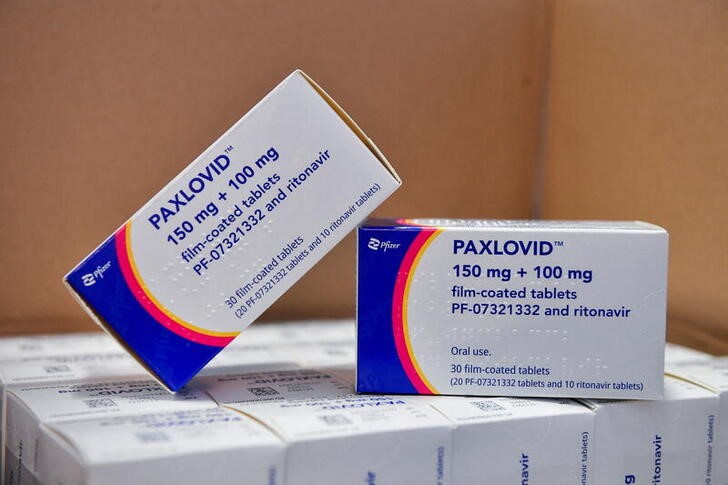By Michael Erman
(Reuters) - More than 2.8 million courses of Pfizer (NYSE:PFE) Inc’s COVID-19 oral antiviral treatment Paxlovid have been made available at pharmacies around the United States, with the Biden administration working to improve access to the drug.
As Paxlovid has become more widely used, some patients have reported that COVID-19 symptoms recurred after completing treatment and experiencing improvement. Here is the latest information on these rebounds:
How common is a recurrence of COVID symptoms shortly after Paxlovid treatment?
Dozens of individuals have reported rebounding COVID symptoms on social media or to the U.S. Food and Drug Administration after taking Paxlovid, but Pfizer suggests the experience is rare.
Pfizer has said that from more than 300,000 patients it is monitoring who received the 5-day treatment, around 1-in-3,000 - about 0.03% - reported a relapse after taking the pills.
That is a lower rate than Pfizer saw in its Paxlovid clinical trial, where about 2% of participants experienced a rebound in viral levels after completing treatment.
The Pfizer trial suggested relapses may be a broader COVID trend as a similar number of those who had received a placebo also had a rebound in viral load levels.
Why are these recurrences happening?The cause not yet known. Some doctors have suggested that because the drug attacks the virus so quickly, some patients' immune responses to COVID may be muted, allowing the virus to replicate again. Others have said there may be a not yet identified common characteristic among those who suffer a rebound.
Pfizer Chief Development Officer William Pao said it may be related to the virus itself, not Paxlovid, since the phenomenon was found among patients who got the drug and those who did not.
The U.S. Food and Drug Administration has also said it is unclear whether rebounds are related to Paxlovid.
Should I take a second course of Paxlovid after a rebound?
Not according to the FDA. It said last week that there is no evidence of benefit for taking a second 5-day course of the pills or for a 10-day course.
Pfizer has suggested otherwise. Chief Executive Albert Bourla has said that patients and doctors had told Pfizer a second five-day course of Paxlovid had cleared the virus. Mikael Dolsten, the company’s chief scientific officer, recently said some immunocompromised patients “may carry this virus for a very, very long time,” and may need to take multiple courses or for an extended duration.
The FDA stressed that the rebounds do not change Paxlovid's ability to reduce hospitalization and death.
Who is eligible for Paxlovid?
Eligibility for Paxlovid differs by country. In the United States, Paxlovid is authorized for patients at high risk for progression to severe COVID-19 whether or not they are vaccinated.
According the U.S. Centers for Disease Control and Prevention, these groups include anyone aged 65 or older and people with risk factors such as obesity, diabetes, cancer or use of immunosuppressive medicine. Bourla has estimated half of American adults are eligible.
Does Paxlovid work against long COVID?
Paxlovid is not authorized to treat the lingering, debilitating condition known as long COVID. However there have been recent case studies of patients with long COVID who experienced relief of symptoms after taking Paxlovid.
